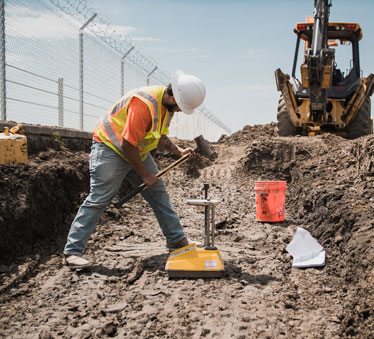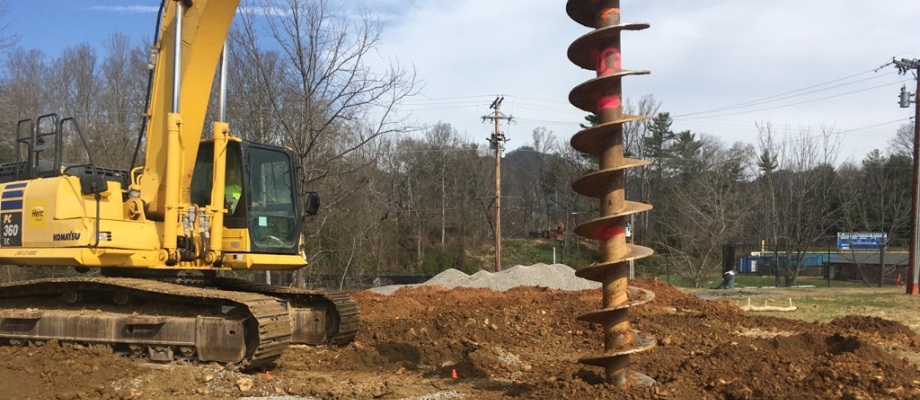The Development of Civil Consulting Engineers in the Modern Age
The Development of Civil Consulting Engineers in the Modern Age
Blog Article
Recognizing the Comprehensive Role of Geotechnical Engineers in Ground Investigation and Soil Analysis for Building And Construction Tasks
Geotechnical designers are essential to the success of construction projects, giving necessary insights with detailed ground examinations and soil analysis. Their experience in analyzing soil behavior and using advanced screening strategies educates important decisions that promote architectural honesty and safety. By identifying prospective dangers and teaming up with multidisciplinary teams, these professionals substantially influence job end results, consisting of efficiency and cost-effectiveness. The complexities of their duty typically extend beyond these features, prompting a deeper expedition right into the methodologies they use and the effects of their findings on general job feasibility.
Role of Geotechnical Designers
The crucial role of geotechnical engineers in construction projects can not be overemphasized, as they supply important understandings right into soil actions and site problems. These experts are entrusted with examining the suitability of the ground for numerous sorts of structures, guaranteeing security and security throughout the construction process. Their experience encompasses a vast array of activities, consisting of site characterization, soil sampling, and laboratory testing, which are vital for establishing the mechanical and physical residential properties of the soil.
Geotechnical designers use their findings to establish fundamental designs that accommodate load-bearing needs and mitigate dangers connected to dirt negotiation, liquefaction, and slope stability. They play a vital duty in identifying possible hazards, such as groundwater variations and contamination, which can substantially affect task feasibility. They work together with designers, civil engineers, and service providers to make sure that geotechnical considerations are incorporated right into the overall layout and building and construction stages.
Ground Examination Techniques
Ground examination techniques develop the foundation of geotechnical engineering, making it possible for engineers to get a comprehensive understanding of subsurface problems. These techniques are necessary for assessing soil homes, identifying groundwater levels, and recognizing potential geological risks.
Usual approaches consist of borehole drilling, which permits the removal of soil examples at various depths, supplying critical data for analysis. Furthermore, in situ screening methods, such as Conventional Penetration Tests (SPT) and Cone Infiltration Examinations (CPT), are used to assess dirt toughness and density directly in the ground.
Geophysical methods likewise play a considerable role in ground examinations. Strategies such as seismic surveys and electrical resistivity tomography assistance evaluate subsurface attributes without comprehensive excavation. geotechnical industry. These non-invasive approaches are specifically useful in delicate or huge locations where disruption need to be lessened
Additionally, exploratory trenches can be dug deep into to aesthetically evaluate dirt layers and determine any type of abnormalities. Each of these strategies contributes distinct insights, allowing geotechnical engineers to develop accurate website assessments and educate layout choices. In recap, a combination of these ground examination methods is essential for successful building and construction projects, making sure safety and security and architectural integrity.
Soil Evaluation Techniques
Dirt evaluation techniques are important for comprehending the physical and chemical residential properties of soil, which straight influence the layout and building of foundations and various other structures. Numerous techniques are employed to examine soil characteristics, making sure that geotechnical engineers obtain exact data for informed decision-making.
One frequently used technique is grain dimension analysis, which figures out the circulation of fragment sizes within a soil example. This is vital for browse around these guys classifying soil types and forecasting their actions under load. Another necessary technique is Atterberg limitations screening, which assesses the plasticity and wetness web content of fine-grained soils, providing understandings into their engineering buildings.

Field tests, such as Common Penetration Examinations (SPT) and Cone Penetration Examinations (CPT), deal important in-situ information concerning dirt stamina and stratification. Jointly, these dirt evaluation approaches form the foundation of geotechnical examination, permitting designers to make effective and safe frameworks tailored to the particular problems of the website.
Danger Mitigation Strategies
Executing reliable risk reduction approaches is essential for geotechnical designers to deal with prospective obstacles in building and construction jobs. link These strategies are essential in identifying, examining, and handling dangers linked with dirt conditions, site stability, and groundwater changes, which can adversely affect job outcomes.
One primary strategy involves carrying out extensive site investigations that use sophisticated geophysical techniques and extensive soil tasting. By acquiring exact information on subsurface problems, engineers can make informed decisions on style and building and construction methods. Furthermore, utilizing predictive modeling devices permits for the simulation of numerous scenarios, enabling engineers to anticipate possible troubles and apply preventive measures.
Additionally, establishing clear communication channels amongst job stakeholders fosters a joint strategy to run the risk of administration. Routine updates and consultations make sure that all parties are conscious of the evolving site problems and can adjust their approaches as necessary.

Influence On Building Tasks
The efficiency of danger reduction methods directly affects the overall success of building jobs. Geotechnical engineers play a pivotal duty in this domain name, as their competence in ground investigation and soil evaluation notifies critical decisions throughout the building process. By precisely examining soil problems and identifying possible dangers, these professionals allow task teams to devise reliable services that lower risks connected with ground instability, water infiltration, and other geotechnical difficulties.
The influence of comprehensive geotechnical evaluation is obvious in different facets of building projects, consisting of price management, task timelines, and structural integrity. Early identification of issues permits for timely treatments, minimizing pricey hold-ups and budget overruns. In addition, a comprehensive understanding of site conditions improves the layout and design procedure, making certain that frameworks are constructed to endure environmental stress and prospective natural catastrophes.
Eventually, the contributions of geotechnical designers are indispensable to the effective execution of building projects. Their job not only fosters security and conformity with policies however additionally boosts the long-term sustainability of frameworks, making sure that they do properly throughout their desired life expectancy. The collaboration in between various other stakeholders and geotechnical groups is essential for attaining optimum end results in construction ventures.
Conclusion
To conclude, geotechnical engineers execute an essential function in construction jobs via extensive ground investigations and dirt analyses. Their competence in analyzing soil habits, using various examination techniques, and implementing threat mitigation approaches substantially contributes the original source to the architectural integrity and safety of constructed settings. By collaborating with multidisciplinary teams, these experts improve task effectiveness and make certain compliance with safety requirements, inevitably leading to successful building results and decreased potential risks.
Geotechnical engineers are indispensable to the success of building jobs, offering necessary insights with extensive ground examinations and soil evaluation.The essential function of geotechnical designers in building and construction projects can not be overemphasized, as they provide crucial understandings right into dirt actions and site problems. Their experience incorporates a broad variety of tasks, including site characterization, dirt tasting, and laboratory screening, which are crucial for establishing the physical and mechanical residential or commercial properties of the soil.
By accurately assessing soil problems and recognizing possible dangers, these specialists make it possible for project groups to design effective remedies that reduce risks associated with ground instability, water infiltration, and various other geotechnical challenges.
In verdict, geotechnical designers do an important function in building jobs via thorough ground examinations and soil evaluations.
Report this page